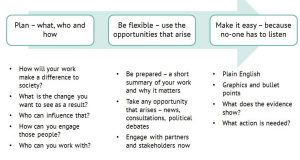I presented a session today on engaging with policy makers, part of a regular series of workshops that we run at BU for academic and professional support staff. As it isn’t always easy for staff to find time to attend these sessions, here are some of the key points.
It is easy to start a session like this with links to the many excellent resources on engaging policy makers. I have put some at the end of this blog. But my main point was that actually engaging with policy makers is not the beginning of the policy impact journey – it comes later. And that’s not because you can only engage with them when you have published research – it’s because you need to engage with them when you are clear about what your message is and what the action is that you want them to take. And also you will be more successful when you have already done a lot of engagement with other people beforehand so that they are ready to listen and take that crucial next step.
Engagement with other people is important for another reason – policy makers really only have time for things that are directly relevant and current, or in which they have a deep and personal interest. And while there is lots of advice on how to find out what is relevant and current, that changes. Today’s priority may not be one tomorrow, when an issue blows up that no-one was expecting. Or when they change jobs – as happens a lot.
So timing is everything and policy engagement is a two track process – the long term plan to engage those with long term, deep or personal interests in the relevant area, and the short term opportunistic engagement. The most important thing is to start now, including by preparing for the opportunistic engagement. If your issue suddenly becomes topical it will be much easier if you have prepared and don’t have to start writing overnight. And you’re more likely to be heard if people have heard about you and your research before.
So today’s workshop included a planning process – not very exciting, perhaps – there are no press releases or Westminster events on here. And maybe it’s obvious – start at the beginning by defining what difference the work will make in the world and what the change is that you want to see, and then work out who else wants the same things and work from there. In the meantime, be flexible and make it easy. If a politician wanted to speak about your work in the House of Commons tomorrow, what would you want them to say?

And once you have defined the what and the who, we can talk about the how.
There are tools to help with this in BU’s BU’s RKEO Impact toolkit. Parliament’s website has a whole host of resources including some accessible how to guides and infographics. The LSE impact blog is an excellent source of advice and information, and there are others too (eg UCL’s public policy pages). There is guidance from the National Co-ordinating Centre for Public Engagement. Our BU press team and RKEO impact teams are brilliant and well informed.
If you are interested in a discussion about any of this, or perhaps to run our workshop, please contact the policy team.

 Are you interested in developing the real-world impact of your research? How about increasing your public profile? If you’ve answered yes to any one of those questions, then the Research Communication Day is for you.
Are you interested in developing the real-world impact of your research? How about increasing your public profile? If you’ve answered yes to any one of those questions, then the Research Communication Day is for you.



















 New weight change BU paper
New weight change BU paper One week to go! | The 16th Annual Postgraduate Research Conference
One week to go! | The 16th Annual Postgraduate Research Conference Geography and Environmental Studies academics – would you like to get more involved in preparing our next REF submission?
Geography and Environmental Studies academics – would you like to get more involved in preparing our next REF submission? Congratulations to three former BU staff
Congratulations to three former BU staff MSCA Staff Exchanges 2024 Call – internal deadline
MSCA Staff Exchanges 2024 Call – internal deadline Applications are now open for 2025 ESRC Postdoctoral Fellowships!
Applications are now open for 2025 ESRC Postdoctoral Fellowships! Horizon Europe – ERC CoG and MSCA SE webinars
Horizon Europe – ERC CoG and MSCA SE webinars MaGMap: Mass Grave Mapping
MaGMap: Mass Grave Mapping ERC grants – series of webinars
ERC grants – series of webinars